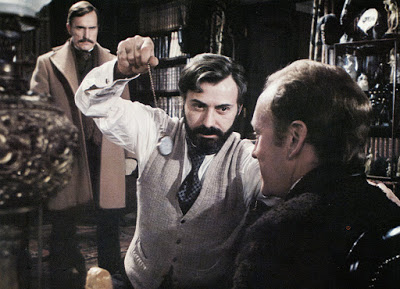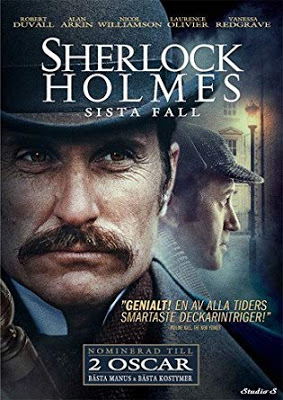Director: Herbert Ross
Year: 1976
Rating: 7.0
As has become my habit of late, if after finishing a book there is a film
adaptation of it I do my best to run it down. That was the case here. The
film is based on the novel by Nicholas Meyer which had been a best seller
and the film did quite well also receiving a few rave reviews and good box
office. Meyer took the Holmes character and turned him and the myth of Moriarty
on its head. He was to go on and write three more books about Holmes, the
latest coming in 2019. The book is a quick page turner for the most part
and I am already on to the second book, The West End Horror. The film essentially
follows the book which is not too surprising in that Meyer wrote the screenplay
as well. This injected Meyer into the film business as well as being an author
and he directed a few excellent films - Time After Time (a film I love) and
is credited with getting the Star Trek film franchise on the right track
after the first one opened to dismal results. He directed two of them and
scripted three of them.

This is very much a quality production - sort of the way Hollywood once did
things - get great talent - director Herbert Ross who already had The Owl
and the Pussycat, Play It Again Sam (another favorite of mine), Funny Lady
and The Sunshine Boys on his resume and a top cast that includes Nicol Williamson
(Holmes), Robert Duvall (doing his best English accent as Watson in an odd
casting choice), Alan Arkin (doing his best Austrian accent with a tinge
of Hungarian as Sigmund Freud), Lawrence Olivier (Moriarty), Samantha Eggar
(Mrs. Watson), Joel Gray (a kidnapper), Charles Gray (Mycroft), Jeremy Kemp
(the Baron) and Vanessa Redgrave (as the lady in distress). Some of these
parts are quite small but they still went out and got excellent actors for
the roles.

One review by the NY Times called the film "nothing less than the most exhilarating
entertainment of the film year to date" - which sort of shows how things
have changed. I quite enjoyed it - I enjoy pretty much anything about Holmes
including those very dull ones made in the early 1930's with Arthur Wontner
- but it feels quite staid and conventional now - a little plodding at times.
Nothing flashy or elaborate - just a good story told well. We have just become
so used to films of this type moving at the speed of light. This one doesn't.
The premise of the book which Watson lays out in the introduction is that
he has kept this manuscript hidden until all the people in it had passed
away and he was now publishing it. He admits upfront that his stories that
had Moriarty in them - only two for all his fame - were fake - to explain
the long disappearance of Sherlock Holmes. This is the true story.

In this version Holmes has become a cocaine addict and is under the delusion
that Professor Moriarty is the Napoleon of Crime and is constantly keeping
him under surveillance while at the same time he is in dread fear that Moriarty
will kill him. Moriarty is in fact just what he seems - a harmless professor
of mathematics. Fearing that Holmes will soon die from his addiction, Watson
and Mycroft conspire to get Holmes to Vienna where he meets Sigmund Freud
who tells Holmes that he can cure him. Nearly the first half of the film
is taken up with this and the withdrawal that Holmes goes through. The second
half turns into an adventure of sorts when a woman is kidnapped and they
try and rescue her.

Here for some reason Meyer changed his book for the worse - turning a plot
to begin a European war into a plot to place a woman into a Turkish harem.
No idea why that change was made - but for the most part the adventure segment
never quite takes off and it is the first half that I found more interesting.
Of course, there have been so many stories written post Doyle with Holmes
- literally hundreds - and in many of them he meets up with historical figures
of the time - Jack the Ripper a few times - but this book is one of the best.
I appreciated the references that I got - to The Hounds of the Baskervilles,
the Red-Headed League, The Adventure of the Speckled Band and he nicely gives
a nod to the first literary detective - G. Auguste Dupin from Poe as Watson
mentions a case in which Holmes chased an orangutan in the Paris sewers,
a clear allusion to The Murders in the Rue Morgue.





